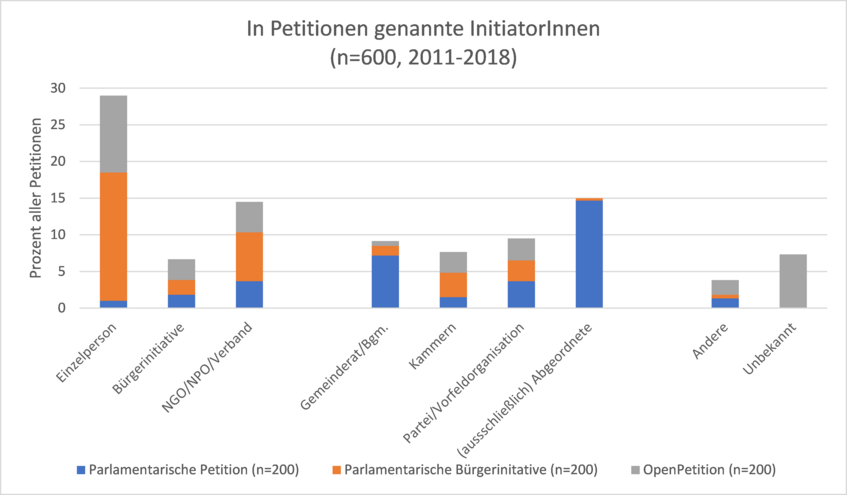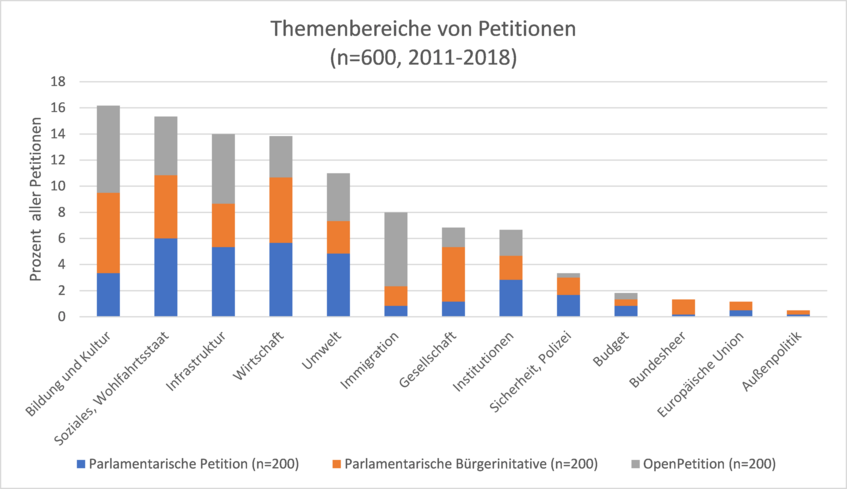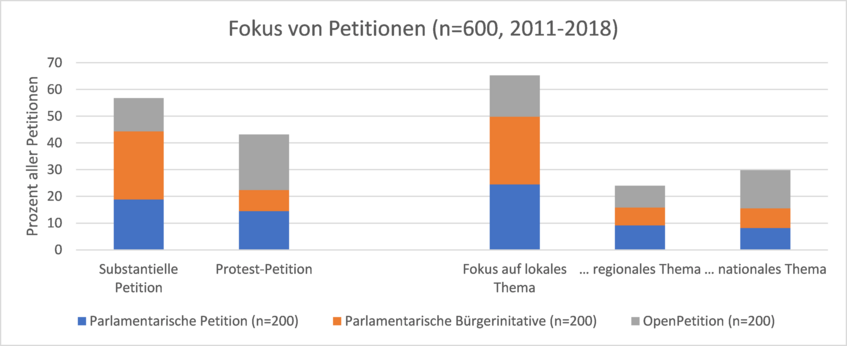PETICIPATE – Petitions and Parliamentary Citizens‘ Initiatives: Linking Citizens and Parliament?
PETICIPATE – Petitionen und Parlamentarische Bürgerinitiativen: Verbindung von BürgerInnen und Parlament?
Team: Sieglinde Rosenberger, Jeremias Stadlmair, Elio Dalpra, Benedikt Seisl
Contact: sieglinde.rosenberger@univie.ac.at
Cooperation partner: Legal, Legislative and Research Services of Austrian Parliament
Project duration: March 2018 – February 2021
Funding institution: Austrian National Bank, Jubiläumsfonds (Project number: 17729)
Project description (in German): PETICIPATE
About the project
Against the backdrop of decreasing support for political institutions and actors of representative democracy, instruments of participatory and direct democracy aim to reconnect citizens and representative politics. In Austria, Parliamentary Petitions and Citizens‘ Initiatives enable citizens to submit initiatives to the Austrian Parliament, either by supplying 500 signatures of support (Parliamentary Citizens’ Initiative) or via a Member of Parliament (Petition). Therefore, these tools broaden the participatory repertoire in the political system of Austria. Apart from these institutionalized instruments, online petitions such as OpenPetition are enjoying increasing popularity.
We scrutinise three types of petitions with regard to their proponents, contents and consequences. For this purpose, we select 600 petitions (the 200 most supported of each type) and code their proponents, contents and consequences (e.g. number of supporters and parliamentary proceedings). Furthermore, qualitative interviews allow us to get in-depth perspectives on the objectives of petitioners and the process of petitioning. Based on these data and using cluster analyses, we explore the functions of petitions in the political system of Austria. In particular, how petitions can contribute to strengthening the linkage between citizens and representative politics.
Findings indicate a broad range of proponents of petitions, including political elites and civil societal actors alike. However, these also depend to some extent on the chosen petition instrument, where Parliamentary Petitions typically cover propositions of politically established actors, while the instrument of Parliamentary Citizens’ Initiatives typically is used by civil societal actors (see Figure 1). The contents of petitions cover a broad range of topics (see Figure 2), which often focus on local issues. Furthermore, the majority of petitions contain a substantive proposition, meaning it aims for a policy change and not for a maintenance of the status quo, this depends on the type of petition: While petitions at OpenPetition mostly contain a protest message, typically directed against national or regional governments, Parliamentary Citizens’ Initiative bring new propositions into parliament (see Figure 3).
The societal and scientific contribution of PETICIPATE is threefold: First, it enables a better understanding of the different forms of petitions, their bottom-up and top-down procedures as well as parliamentary processes. Second, proponents of petitions may benefit from information on direct and indirect effects of petitions collected in this project. Third, we develop recommendations for the procedures of Parliamentary Petitions and Citizens’ Initiatives in Austria.
Further information on Petitions and Parliamentary Citizens’ Initiatives: https://www.parlament.gv.at/PERK/BET/
Activities & Events
- "Der Trend zur Klick-Demokratie" Elio Dalpra, Sieglinde Rosenberger und Jeremias Stadlmair sprechen über das Forschungsprojekt PETICIPATE sowie die Besonderheiten von Online-Petitionen und den Vergleich mit den "klassischen" Petitionsinstrumenten in Österreich, June 9th 2020.
- "Demokratie geht nicht ohne mich! Politik und Online-Petitionen" Elio Dalpra und Sieglinde Rosenberger in: Politikwissenschaftsblog derStandard.at, April 22th 2020.
- Presentation of papers at ECPR General Conference 2019
"Petition Follows Actors? Off- And Online Petitioning in Austria", Elio Dalpra, Sieglinde Rosenberger, Jeremias Stadlmair, Benedikt Seisl, at University of Wroclaw, September 5th 2019.
"Linking Representatives with Constituents, or Aligning Parties and Voters? Petitioning in the Austrian Parliament", Jeremias Stadlmair & Benedikt Seisl, at University of Wroclaw, September 6th 2019.
- "Wort der Woche" in Ö1: Jeremias Stadlmair spricht über Petitionen, April 3th 2019.
- Paper presentation at ECPR General Conference 2018: "Who Peticipates? Proponents of Parliamentary Citizens‘ Initiatives and Petitions in Austrian Parliament", Jeremias Stadlmair, Sieglinde Rosenberger & Benedikt Seisl, at University of Hamburg, August 23th 2018.
Project-related literature and publications
- Rosenberger, Sieglinde/Seisl, Benedikt, Parlamentsdirektion (eds.) (2021). Petitionen in Österreich. AkteurInnen - Prozesse - Funktionen, Wien: Parlamentsdirektion.
- Rosenberger, Sieglinde/Seisl, Benedikt/Stadlmair, Jeremias/Dalpra, Elio (2020). What Are Petitions Good for? Institutional Design and Democratic Functions. In: Parliamentary Affairs, https://doi.org/10.1093/pa/gsaa058.
- Rosenberger, Sieglinde/Stadlmair, Jeremias (2016). Petitionen und Parlamentarische Bürgerinitiativen - Zivilgesellschaft im Parlament?, in: TransForm. Journal für zivilgesellschaftliche Innovation, Vol. 1(1), 68–89.
- Rosenberger, Sieglinde/Stadlmair, Jeremias (2015). Direkte Demokratie - Regierungstechnik oder Instrument der BürgerInnen?, in: Öhlinger, Theo/Poier, Klaus (eds.): Direkte Demokratie und Parlamentarismus. Wie kommen wir zu den besten Entscheidungen?, Wien: Böhlau, 227–251.
- Rosenberger, Sieglinde/Stadlmair, Jeremias (2014). Partizipation in Österreich, in: Bertelsmann Stiftung/Staatsministerium Baden-Württemberg (eds.): Partizipation im Wandel. Unsere Demokratie zwischen Wählen, Mitmachen und Entscheiden, Gütersloh: Verlag Bertelsmann Stiftung, 454–488.
- Riehm, Ulrich/Böhle, Knud/Lindner, Ralf (2013). Elektronische Petitionssysteme. Analysen zur Modernisierung des parlamentarischen Petitionswesens in Deutschland und Europa, Berlin: Edition Sigma.
- Hough, Richard (2012). Do Legislative Petitions Systems Enhance the Relationship between Parliament and Citizen?, in: The Journal of Legislative Studies, Vol. 18(3–4), 479–495.
- Rosenberger, Sieglinde/Seeber, Gilg (2007). Zivilgesellschaft durch direkte Demokratie?, in: Landeszentrale für politische Bildung Baden Württemberg, Vol. 57(4), 233–239.
- Blümel, Barbara (2005). ... sich Gehör verschaffen. Petitionen und Bürgerinitiativen, in: Forum Parlament, Vol. 3(2), 60–62.
- Korinek, Karl (1977). Das Petitionsrecht im demokratischen Rechtsstaat, in: Recht und Staat in Geschichte und Gegenwart, Vol. 474/475, 1–41.

Data: parlament.gv.at; openpetition.eu/at

Data: parlament.gv.at; openpetition.eu/at

Data: parlament.gv.at; openpetition.eu/at
